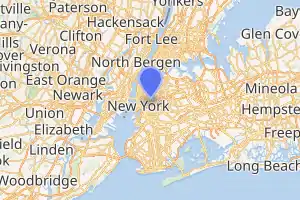Riis Houses
The Jacob Riis Houses are a public housing project managed by the New York City Housing Authority (NYCHA) in the East Village in New York City. The project is located between Avenue D and the Franklin D. Roosevelt Drive, spanning two superblocks from 6th Street to 13th Street. The project consists of thirteen buildings, between six and 14 stories each, containing 1,191 apartment units.[3]
Jacob Riis Houses | |
|---|---|
 Riis Houses in 2008 | |

Location in New York City | |
| Coordinates: 40.723917°N 73.974659°W | |
| Country | United States |
| State | New York |
| City | New York City |
| Borough | Manhattan |
| Area | |
| • Total | 0.018 sq mi (0.05 km2) |
| Population | |
| • Total | 2,738 [2] |
| ZIP codes | 10009 |
| Area code(s) | 212, 332, 646, and 917 |
| Website | my |
Development
The area to become the Riis houses was destroyed through urban renewal beginning in August 1943 but construction was delayed because of World War II.[4][5] The Riis Houses were completed on January 17, 1949 and named for photographer Jacob Riis, who exposed the living conditions of tenement dwellers on the Lower East Side.[3]
The playground was designed to have four "outdoor rooms" for a variety of activities and was designed by Pomerance & Breines with M. Paul Freidberg & Associates as landscape architects.[6] It was financed through a grant from the Victor Astor Foundation and opened in 1966 with Ladybird Johnson attending its opening.[7] Later that year, it received a First Honor Award for design excellence by the Department of Housing and Urban Development.[6] Four new playgrounds throughout the city were modeled from it in 1967.[8] In 2018, its playground was inspected by NYCHA and found to be hazardous.[9]
During Hurricane Sandy in 2012, the development was hit by a storm surge that left it without electricity and other services.[10][11] In 2018, NYCHA received a grant for $7.1 million to fund necessary infrastructure repairs from Sandy anticipated to begin in 2022. Upgrades include: emergency generators, electrical distribution equipment, waterproofing of structures and finishes, upgrades to sewer/storm management systems, new roadways, pedestrian lighting, rehabilitation of building entrances and lobbies.[12]
Notable residents
- Frank Morales (1949–), priest and activist
- Sabu (1983–), computer hacktivist[13]
References
- "Jacon Riis Houses Area". Retrieved November 7, 2019.
- "Jacob Riis Houses Population".
- "MyNYCHA Developments Portal". my.nycha.info. Retrieved July 23, 2019.
- "THE LOWER EAST SIDE CHANGES". New York Times. Retrieved July 23, 2019.
- "CORNERSTONE LAID AT THE RIIS HOUSES; Renewal of Federal Aid Urged at Last Project Under Way Here With Help of FPHA". New York Times. Retrieved July 23, 2019.
- "Designers of 7 Developments Honored by U.S. Agency; JACOB RIIS HOUSES GAIN AWARD HERE". New York Times. Retrieved July 23, 2019.
- "Mrs. Johnson Opens Riis Playground; Mrs. Johnson Comes Here to Help Open the Experimental Riis Playground". New York Times. Retrieved July 23, 2019.
- "City Is Building 12 Movable Playgrounds; Designs Allow for Freedom in Shaping". NY Times. January 28, 1967. Retrieved July 23, 2019.
- Otterman, Sharon (April 4, 2018). "Audit Finds Playground Perils in Housing Authority Developments". The New York Times. ISSN 0362-4331. Retrieved July 23, 2019.
- Buckley, Cara; Wilson, Michael (November 2, 2012). "In Public Housing After Hurricane Sandy, Fear, Misery and Heroism". The New York Times. ISSN 0362-4331. Retrieved July 23, 2019.
- "Life after Sandy remains hard for New York's poor". The Independent. November 2, 2012.
- "WDF Announces $71 Million Jacob Riis Houses Restoration Project". www.businesswire.com. December 5, 2018. Retrieved July 23, 2019.
- Kleinfield, N. R.; Sengupta, Somini (March 8, 2012). "Hacker, Informant and Party Boy of the Projects". The New York Times. "Hector Xavier Monsegur, or Sabu, lived in Apartment 6F at 90 Avenue D in the Jacob Riis complex in Manhattan."
.jpg.webp)